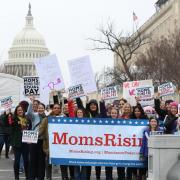In 1996 I became a mother. I was the first in my group of friends to do so, and was getting an up close and personal lesson about the economic and time crunch that comes with such a leap. I started wondering, how do other moms patch together caring for family and work? What's really going on with mothers right now?
I had my daughter several years later, and those same questions just wouldn’t go away. Everyone I knew was winging it. (In our modern economy almost three-quarters of mothers are employed, but clearly our societal supports haven’t caught up with moms yet). I wanted the big picture.
As a numbers junkie, my first probing call in the mid-90s was to the repository of all national statistics, the U.S. Census, looking for answers. How many moms were staying home with children? What were moms doing in America? Well, they didn’t have answers. They don’t track those issues. And neither, by the way, does the Bureau of Labor Statistics. It was a starting point for me, and also a symptom of a far greater problem—the invisible, uncounted, and unrecognized struggles of modern mothers. After all, what isn’t seen or counted must not be happening, right?
The very personal became political as I realized that what I was experiencing as a mother was actually part of a larger shared problem. I dug deeper. It turned out that all the national talk about “family values” had little to do with actually addressing the issues regular families, and mothers, face each and every day—like how to pay for child care, or how to afford being a full-time parent; like the lack of paid family leave, flexible work options, after school care, and a failing health care system. I was appalled. And, I started writing. In fact, it’s safe to say that motherhood brought me into writing.
A key point I found is that the rising “mommy wage gap”—an indication of how far the U.S. is from supporting families—can be fixed. (One study found that women without children make 90 cents to a man’s dollar, moms make 73 cents, and single moms make 56 to 66 cents to a man’s dollar). But in fact, studies show the mommy wage gap has significantly narrowed in other countries where family policies and programs such as those suggested in The Motherhood Manifesto are implemented.
Paid family leave, flexible work options, subsidized health care, and affordable childcare don’t just make it easier for parents to get through the work week, such programs also “raise all boats” by fixing the economic undermining that comes with motherhood. I truly believe positive changes can happen here in the United States. They’ve already happened elsewhere.
It is an honor and a privilege to be part of MomsRising and to help move these important issues forward. It’s long past time to address solutions to the time and economic crunch that comes with having a family in America. Join us. Together we can make a difference.



The views and opinions expressed in this post are those of the author(s) and do not necessarily reflect those of MomsRising.org.
MomsRising.org strongly encourages our readers to post comments in response to blog posts. We value diversity of opinions and perspectives. Our goals for this space are to be educational, thought-provoking, and respectful. So we actively moderate comments and we reserve the right to edit or remove comments that undermine these goals. Thanks!